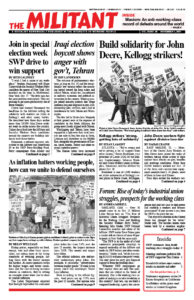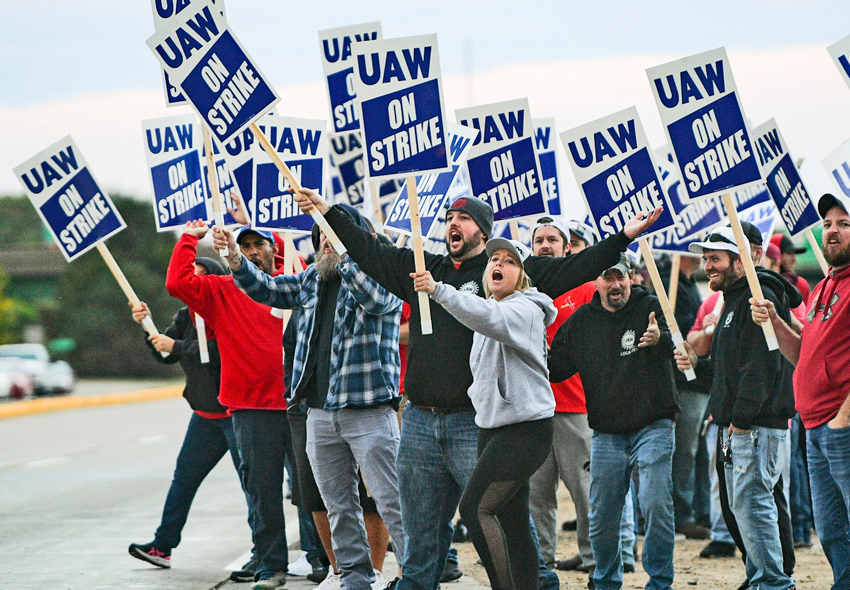EAST MOLINE, Ill. — Members of the United Auto Workers at John Deere have joined the ranks of workers taking strike action to fight against boss attacks on pay, benefits and working conditions. More than 10,000 workers walked out Oct. 14 at the farm and construction equipment manufacturer’s 14 plants, most of them in Iowa and Illinois.
Four days earlier the workers voted down a proposed contract by a resounding 90%. One of the central issues is the company’s demand that new hires receive no traditional pension and to create a third tier of workers.
“There’s a lot of new hires. I’m not going to sell them up the river,” Tina Swanson, a member of UAW Local 865 who’s worked at the Deere Harvester plant here for 14 years, told the Militant on the picket line the first day of the strike. “That’s what happened in 1997. We’re not going to do a three-tier contract. This could be my grandchildren’s future.”
In 1997, UAW members at Deere took concessions that created a second tier. Workers hired after that date receive lower pay and pensions than the pre-1997 workforce.
Many other strikers this worker-correspondent spoke to here, and at the forestry equipment plant in neighboring Davenport, Iowa, echoed her view. They’ve seen how different tiers divide workers. And they’re determined to regain some of what’s been lost, instead of giving up more.
“We need more pay to keep up with rising prices,” said Alex Melody, who has three years seniority and works in the paint department. The company has offered a six-year deal with a 5% or 6% raise now, and then only 3% in the third and fifth years. This is below today’s inflation rate.
“The company is making tons of money,” Melody said. “We just want a future.” John Deere posted record earnings of $1.79 billion in the second quarter, and is projecting nearly $6 billion in profits for 2021.
“Higher wages is number one for me. And elimination of tiers,” said Josh Krebs. He’s worked for eight months as a mechanical assembler here. He and other workers described how part of their pay comes in the form of productivity bonuses. Workers on some lines get more than those on others, based on factors out of their control. Krebs also said he thought it unfair that newer workers often face seasonal layoffs, and lose their seniority rights when they take jobs at other Deere facilities.
Inspired by other fights
This is the first strike at John Deere since 1986. Workers here have been following other labor battles around the country, including strikes by bakery workers at Nabisco and Kellogg’s. Some said they were encouraged to take a stand by the UAW members at the Volvo plant in Virginia, who voted down three contract proposals and went on strike earlier this year, also over the issue of divisive wage tiers.
Pickets said that within hours of going on strike they already had a visit from a couple of UAW members from a Ford plant in Kansas, who promised to come back with others. Members of UAW Local 865 at the Harvester plant also have some experience offering solidarity to others. Two years ago, a busload of them traveled from East Moline to Bolingbrook, just outside Chicago, to walk the picket lines with strikers at General Motors.
Some 49,000 workers struck GM in 2019, gaining a contract that narrowed some of the divisions they face.
Constant honking from drivers passing the picket line here reflects the local support for the strikers. John Deere has its headquarters and several plants in the “Quad Cities” on the Illinois-Iowa border, and is a major employer in the area.
The company is trying to continue production with supervisors and office staff.
Bosses are trying to undercut support for the UAW members, saying it needs to keep production going so farmers can harvest crops. In an Oct. 14 statement the company said it aims at “meeting the needs of our customers, who work in time-sensitive and critical industries such as agriculture and construction.”
The media repeats the bosses’ efforts to pit strikers against other working people. Fox Business News quoted comments by “supply chain expert” Jennifer Blackhurst, who says a parts shortage at harvest time could create a “perfect storm” for farmers and may drive inflation. “Pointing to the shortages of proteins like bacon, which is hovering at its highest price in 40 years, Blackhurst said the strike could make things even worse.”
Strikers of all generations remain determined. “Our strike and picket line shows the company our unity and gives the company a message,” 19-year-old Jake Blowers told the Militant.


